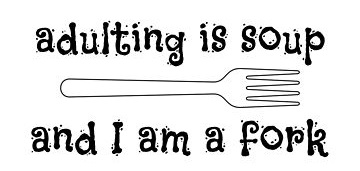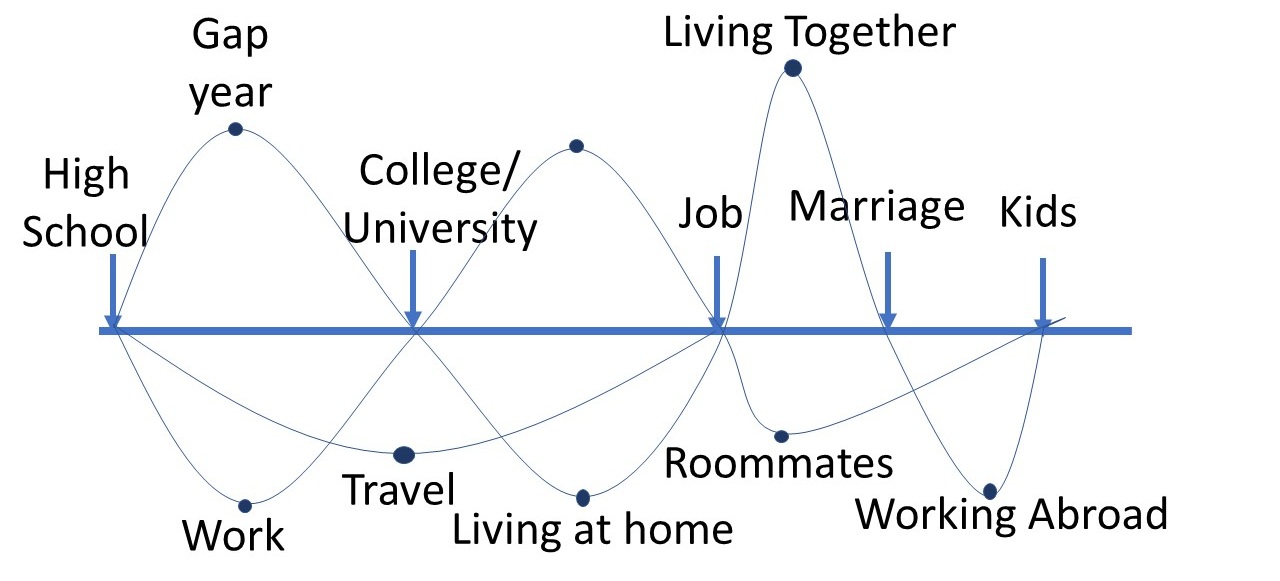What makes someone an adult? Are you an adult? If so, when did you magically cross the line to adulthood?
Do you have moments of #adulting and moments of #stillakid?
My sister and I, maybe because I particularly didn’t follow the traditional path to adulthood, have had an on-going conversation discussing regarding “if we’re adults yet?” We’ve developed a fun list of the things we do that we think qualifies us as an adult: voluntarily choosing to listen to CBC radio, choosing soup for a meal, cleaning out the gunk at the bottom of the sink after you wash dishes, being excited that you get to go to bed early, choosing to buy groceries to go home and cook instead of eating out….
It’s actually really difficult to define adulthood these days – for multiple sociological and philosophical reasons – including some resistance among emerging adults to want to be adults!
Traditionally society, including churches (or perhaps especially churches), tended to look for external markers to signify adulthood: finishing school, getting married, starting a career, buying a house/condo (or a storage closet if you live in Toronto) and starting a family.
Most peoples’ timelines looked something like this…
It was pretty clear and straightforward what was expected of you.
Trouble only arouse when you didn’t follow the expected path and people weren’t sure what to do with you. They usually worked hard to get you back onto the same path as everyone else as soon as possible.
Today, there is no path and so very many possible options open to emerging adults.
The trouble in our churches is, they don’t know what to do with this new kind of uncertain timeline. If someone is 40 and not married where do we put them? If someone is 32 but still living at home where do they go in a group? If someone is 19 but mature and independent, where do they belong? Many in the church family simply don’t know how to have empathy and help when the external markers aren’t the same any more. People don’t fit into the nice categories churches have created.
But maybe, just maybe, these external markers aren’t all that helpful anyway.
Our external markers just seem to divide us off into unhelpful silos anyway.
And besides…come on, are they really the goal? They better not be the goal of the Christian life or we’re in trouble!
Isn’t the goal to know Christ and be known by Him? To come to glorify God in all areas of our lives? To be faithfully following God & growing in Christ? To be able to stand on your own two feet with a sense of self and identity in Christ – even separate from things like one’s relationship status, work title or where you live?
Last week I was teaching a course at Acadia Divinity College about “Reaching and Retaining Young Adults.” The class was full of rich discussions with students of various age. One of our most meaningful discussions was around if we should and could, particularly in churches, shift towards less external and more internal measures of adulthood. Yes, these are much more difficult to measure but perhaps much more helpful. A huge thank you to the students in the class for giving shape to this!
Perhaps we need inwards markers of adulthood such as
Able to present a sense of identity. That is a core of being the same person no matter where they are.
Displaying perseverance through difficulties (stick-to-it-ness)
Displaying love, joy, peace, patience, kindness, goodness, faithful, gentleness and self-control in situations
Able to relate to others, of various background, with depth and understanding
Displaying self-discipline in choosing the right way over the easy way
These markers still need more thought and refinement.
Plus, the trouble with this is I know some 62 year old’s that wouldn’t yet qualify as adults and some 17 year old’s that would!
Nonetheless, I think such character markers, as oppose to external markers, could help us know what we’re aiming for as mentors, leaders, teachers, parents, churches and friends as we help teenagers transition towards adulthood.
And it may be even more helpful to young adults – imagine how they might respond if the community around them cared much more about their character than their relationship status or job title?
How is this different than discipleship, training each other in being followers of Jesus? I don’t think it is any different because as we follow Jesus He teaches us and moulds us into being fully human. Jesus was fully human, and grew into adulthood, and can show us what it means to be a fully alive adult.
So what if with our emerging adults we found ways to notice and celebrate when they:
survived their first 4 months living away from home
shared a little more about Jesus with a friend
recovered from a break-up
sought to love their neighbours through a practical act of goodness
completed their first job interview
left their phone put away to connect in deeper conversation with someone in front of them
stuck to learning a new skill/sport/instrument for at least 1 year
got a mentor
became a mentor
sought to bring change to an area of injustice in our world
began tithing at church
chose to leave an inappropriate party, relationship or situation
initiated a meaningful conversation with a senior citizen
tried a new entrepreneurial enterprise
took on a new leadership role
sacrificed self for others
chose obedience to Christ over what is popular
didn’t take revenge when a wrong was done to them, but actually sought to bless the person/group
Join the conversation that got start with the students. Help us out please:
What are important internal or character markers of adulthood today?
What should we celebrate with our emerging adults?
Thanks for joining the conversation.
Keep joining God in your neighbourhoods and networks, whether you qualify as an adult or not. 🙂
#1neighbourhood
-Renée
@r_embree
@cbacyf



